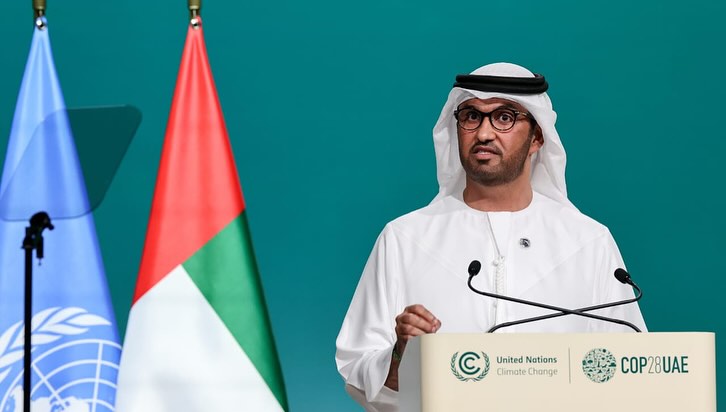
The shy COP27: the protagonists, speeches and conclusions
COP 27 ended lukewarm and without any breaking news. Peggada gives you a summary of the main conclusions. Climate change has been on the table
We didn't find any happenings mapped to your criteria.
Try the traditional search to find articles not yet mapped with RUA.
We didn't find any happenings mapped to your criteria.
Try the traditional search to find articles not yet mapped with RUA.
We didn't find any happenings mapped to your criteria.
Try the traditional search to find articles not yet mapped with RUA.
We didn't find any happenings mapped to your criteria.
Try the traditional search to find articles not yet mapped with RUA.
On the table is the activation of the fund to finance ‘loss and damage’ caused by climate change, as well as a stocktaking since the conclusion of the 2015 Paris Agreement. The venue chosen for the UN climate summit, Dubai, has sparked controversy, as has the fact that the host president is linked to the oil sector.
Between November 30 and December 12, representatives from practically every country in the world will gather in Dubai, in the United Arab Emirates, for the 28th United Nations Climate Change Conference, better known as COP28.
Portugal will be represented by the Prime Minister, António Costa, for the first two days, followed by the Minister for the Environment and Climate Action and secretaries of state from different areas.
Two years after the conference organized in Sharm El Sheikh, Egypt, one of the main highlights of COP28 is the initial assessment of what climate action has been like worldwide since the Paris Agreement was signed at COP21 in 2015. It should be remembered that this agreement set out the objectives of reducing emissions and limiting the rise in global temperatures to, at worst, two degrees Celsius above the values that existed before the industrial era.
From the outset, the representatives will have to acknowledge the failure of this initiative, since the emission of greenhouse gases (GHG) has not only not slowed down, it has accelerated. Moreover, on November 15, the World Meteorological Organization issued a warning that casts a shadow over COP28: the concentration of GHGs broke records again in 2022 – it was the first time that CO2 concentrations were 50% higher than in pre-industrial times.
If this news from two weeks ago was already negative, a new statement issued on the eve of COP28 revealed something even worse: 2023 is expected to be the hottest year ever, at 1.4 degrees above pre-industrial levels. According to the UN, in order to contain the rise in temperatures, a 7.6% reduction in GHG emissions was needed between 2020 and 2030, which is looking increasingly unlikely.
A committed president
Compounding these alarming warnings was the choice of venue for COP28, which immediately sparked controversy and skepticism, given that the United Arab Emirates is one of the world’s leading oil producers. But what really got the ball rolling and cooled expectations that this summit would produce effective results was the choice of the summit’s president-designate, Sultan Al Jaber.
As well as being the UAE’s Minister of Industry, Al Jaber is the Chairman of the Abu Dhabi National Oil Company (ADNOC) and has been responsible for expanding the client portfolio of the company he leads and increasing fossil fuel production.
If this wasn’t enough to reveal a seemingly insurmountable conflict of interest, just a few days before the start of the conference, documents were revealed suggesting that Al Jaber tried to use his position at COP28 to meet with representatives of foreign governments and promote his company’s projects.
This information, leaked by a whistleblower and published by the Center for Climate Reporting and the BBC, shows how Al Jaber had prepared topics of conversation for a series of bilateral meetings that included negotiations on oil and energy projects by UAE companies.
In the documents you can see, for example, how ADNOC planned to propose the sale of liquefied natural gas to Germany, as well as how it intended to evaluate business opportunities in Mozambique, Canada and Australia, summarizes Politico. In another instance, the plan was to communicate to Saudi Arabia and Venezuela – two of the world’s largest producers of oil products – that “there is no conflict between the sustainable exploitation of a country’s natural resources and its commitment to climate change”.
“If these allegations are true, this is totally unacceptable and a real scandal. The leader of the climate summit should be focused on advancing climate solutions in an impartial way, not on arranging secret meetings that fuel the crisis. This is exactly the kind of conflict of interest we feared when the CEO of an oil company was appointed to the post,” reacted Kaisa Kosonen, political coordinator at Greenpeace International.
At first, Al Jaber did not dispute the authenticity of the documents, denying only that he had tried to use his position to promote oil and energy projects in the United Arab Emirates. Later, a COP28 spokesperson officially discredited this report: “The documents referred to in the BBC article are incorrect and have not been used by COP28 in meetings. It is extremely disappointing to see the BBC using unverified documents in its reporting.”

“Historic” fund to come into force – we just don’t know how
Despite the controversies and the pessimism about what might come out of COP28, the first day of the summit was marked by the conclusion of an agreement that had been discussed for a long time but had been slow in coming to fruition: the fund created to finance “loss and damage” caused by climate change.
This was one of the slim achievements of COP27 in Egypt, but it was feared that it would never be put into practice. However, this Friday an agreement in principle was reached on the fund, although little is known about how it will be implemented and in what form.
The idea is to fund 100 billion dollars a year to help combat climate change and its harmful effects. These sums will go mainly to the most economically and environmentally vulnerable countries.
Although the agreement will only become effective with a formal signature by all the participating countries, which will take place at the end of COP28, it is already being seen by Al Jaber as a “historic decision” that is “a positive sign for the world and for our work”. Madeleine Diouf Sarr, president of the group of 46 least developed countries taking part in the summit, said that the decision has “enormous significance for climate justice”.
The fund will be managed by the World Bank for the first four years from its effective start, scheduled for 2024, which has also generated opposition from developing countries. This is because they consider the institution to be controlled by Western countries.
Several countries have already made contributions on the first day of COP28: the European Union announced 245 million dollars, 100 million of which came from Germany – the largest single contribution by a country, along with the same amount announced by the United Arab Emirates. The UK put up 75 million dollars, while the US put up 24.5 million and Japan 10 million.
All these amounts to a total of 429 million dollars, a far cry from the 100 billion expected. The uncertainty about the feasibility of reaching this figure is compounded by the fact that the agreement provides for contributions to be only voluntary and not compulsory, which was agreed under pressure from developed countries.
The figure of 100 billion dollars for aid is itself of dubious effectiveness because, as The Guardian points out, the most recent reports indicate that the damage caused by climate change in developing countries already exceeds 400 billion dollars a year. For this reason, Al Jaber has also stressed the need to double funding for adaptation by 2025.
Until December 12, there will be more than 300 initiatives and parallel events on topics such as health, decarbonization, energy, urbanization, transport, oceans and agriculture. As for the most pressing issues, there will be discussions on establishing rules to regulate the carbon market and – given the predictable recognition of the failure of the Paris Agreement targets – new measures to cut GHG emissions and try to limit the production of fossil fuels.


COP 27 ended lukewarm and without any breaking news. Peggada gives you a summary of the main conclusions. Climate change has been on the table

This article addresses an action that promotes the adoption of urgent measures to fight climate change and its impacts. SDG 13 also aims to improve education on climate change mitigation and impact reduction.
 To discover businesses that are actively working to contribute to this Sustainable Development Goal, click here.
To discover businesses that are actively working to contribute to this Sustainable Development Goal, click here. To read news, interviews or tips related to this Goal, click here.
To read news, interviews or tips related to this Goal, click here.Esta publicação também está disponível em:
![]() Português (Portuguese (Portugal))
Português (Portuguese (Portugal))

